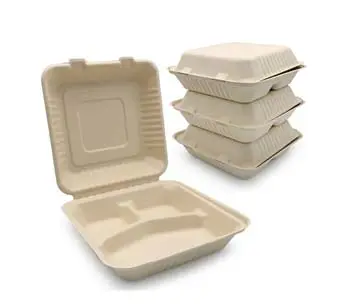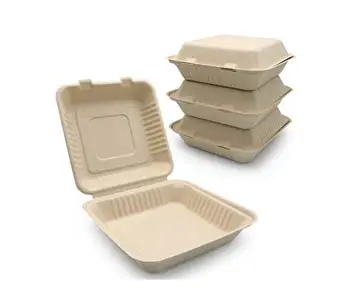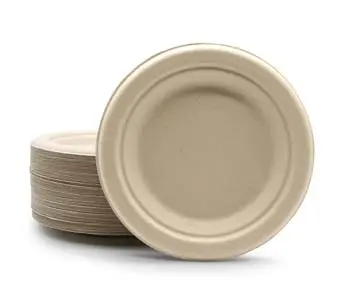In today's rapidly evolving society, the need for environmental consciousness has become more evident than ever before. As we witness the detrimental effects of pollution and climate change on our planet, it is imperative that we shift towards sustainable practices in all areas of our lives. One such area is the use of containers for wholesale purposes.
Eco-friendly containers are designed with the environment in mind, aiming to minimize waste and reduce carbon footprint. These containers are made from materials that are biodegradable, compostable, or recycled, thus offering a greener alternative to traditional packaging options.
Compostable food storage containers are a prime example of eco-friendly containers that prioritize sustainable practices. These containers are made from biodegradable materials that can break down naturally, ensuring that they can be composted and returned to the earth without harm to the environment. By using compostable food storage containers, individuals can contribute to the reduction of waste and embrace a more sustainable approach to packaging and storing their food.
Definition of Eco-Friendly Containers
Eco-friendly containers can be defined as packaging solutions that are specifically designed to have minimal negative impact on the environment throughout their lifecycle. These containers are crafted using materials that are either biodegradable, compostable, or made from recycled components.
The aim is to reduce dependence on non-renewable resources and minimize waste generation by promoting sustainable alternatives. By incorporating eco-friendly designs and materials into wholesale sugarcane biodegradable plates, businesses contribute towards a healthier planet by curbing pollution and preserving natural resources.
Importance of Using Eco-Friendly Containers for Wholesale Purposes
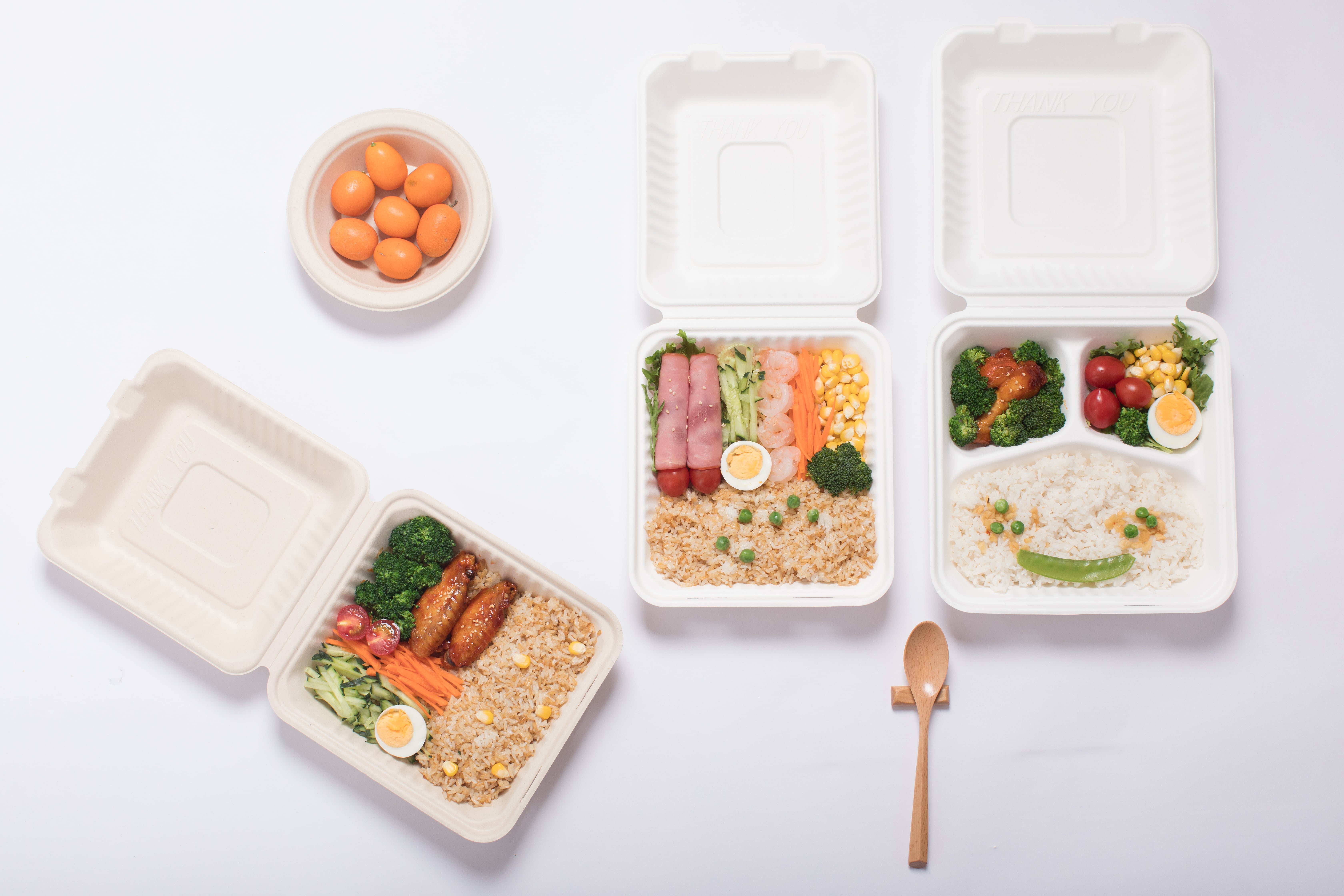
The wholesale industry plays a pivotal role in shaping consumer behavior and impacting sustainability practices globally. Thus, it becomes crucial for wholesalers to adopt eco-friendly container options as part of their operations. Firstly, using disposable eco friendly cutlery helps businesses align with growing consumer demand for environmentally conscious products and services.
With increased awareness about climate change and its consequences, consumers actively seek out brands that prioritize sustainability efforts. Furthermore, utilizing eco-friendly containers for wholesale purposes showcases a company's commitment to corporate social responsibility (CSR).
By actively reducing waste generation and choosing sustainable packaging solutions, wholesalers set an example for other industries to follow suit. Moreover, adopting eco-friendly container options offers numerous financial benefits in the long run.
Although initial costs may be slightly higher, businesses can save money on waste disposal and potentially reduce shipping costs due to lighter packaging materials. Overall, using eco-friendly containers for wholesale purposes not only benefits the environment but also enhances a company's reputation improves consumer perception, and contributes to a more sustainable future.
Overview of Eco-Friendly Containers
Materials used in eco-friendly containers
Eco-friendly containers are crafted using a variety of sustainable materials that minimize harm to the environment. Biodegradable materials are among the most popular choices in this domain.
Plant-based plastics, also known as bioplastics, offer a viable alternative to traditional petroleum-based plastics. These biodegradable plastics are derived from renewable resources like corn or sugarcane and possess the remarkable ability to break down into natural components when disposed of properly.
In addition to plant-based plastics, other biodegradable options include bagasse based food packaging made from sugarcane fiber waste and bamboo containers, which serve as an eco-conscious substitute for conventional plastic or foam alternatives. Recycled materials also play a prominent role in eco-friendly container manufacturing.
Paperboard containers, for instance, are created using recycled paper fibers. These versatile containers find ideal usage in packaging dry food items and beverages due to their sustainability and sturdiness.
Cardboard boxes constructed from recycled cardboard material serve as excellent choices for shipping and storing various products while reducing environmental impact. Compostable materials form another category of eco-friendly container options.
PLA (Polylactic Acid), an innovative material derived from renewable resources such as corn starch, is gaining prominence due to its compostable nature. When disposed of correctly, PLA breaks down through industrial composting processes, leaving behind no harmful residues.
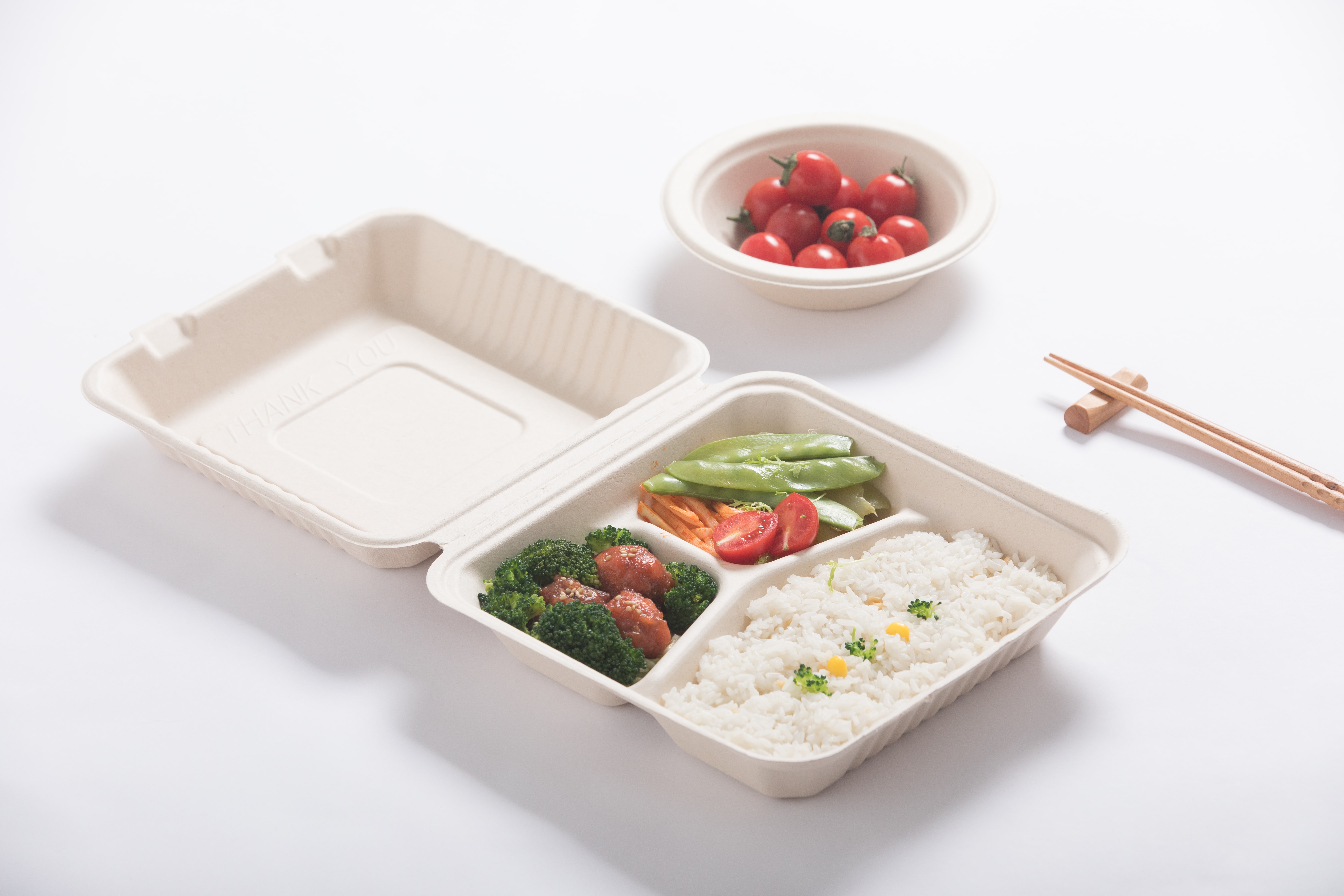
Advantages of using eco-friendly containers
The utilization of eco-friendly containers brings forth a myriad of benefits that extend beyond preserving the planet's health alone. Firstly, opting for these environmentally conscious alternatives leads to a significant reduction in overall environmental impact by diminishing reliance on non-renewable resources and minimizing waste generation.
By shifting away from traditional single-use plastic options towards biodegradable or compostable alternatives, businesses contribute positively towards curbing pollution levels and conserving energy. Moreover, eco-friendly containers offer health benefits for both consumers and workers alike.
Traditional plastic containers often contain harmful chemicals like bisphenol A (BPA) that can leach into food, posing potential risks to human health. In contrast, eco-friendly containers made from natural and sustainable materials eliminate the presence of such toxins, ensuring a safer experience for consumers.
Choosing to align with eco-friendly practices by utilizing sustainable packaging solutions creates a positive brand image and enhances customer perception. In today's environmentally conscious world, consumers are increasingly drawn toward businesses that prioritize sustainability.
By adopting eco-friendly container options, wholesalers can demonstrate their commitment to environmental responsibility and attract environmentally-conscious customers who appreciate and support such initiatives. The utilization of biodegradable, recycled, and compostable materials in the manufacturing process of wholesale containers showcases a deep commitment to sustainability by reducing environmental impact, promoting human health, and cultivating a positive brand image.
Types of Eco-Friendly Containers Wholesale Available
Biodegradable Containers
Plant-based plastic containers:
Plant-based plastic containers are an innovative solution to the environmental challenges posed by traditional petroleum-based plastics. Derived from renewable resources such as corn or sugarcane, these containers offer a sustainable alternative.
When disposed of properly, they break down into natural components, reducing their impact on the environment. Moreover, they require fewer fossil fuels and emit fewer greenhouse gases during production, supporting a more eco-conscious supply chain.
Bagasse containers:
Bagasse containers are made from sugarcane fiber waste, which is a byproduct of the sugar manufacturing process. By utilizing this waste material, bagasse containers contribute to waste reduction and promote the efficient use of resources.
Sugarcane fiber packaging, such as bagasse containers, offers an excellent alternative to traditional packaging materials. By repurposing sugarcane fiber waste, these containers minimize the need for additional resource extraction and reduce the overall environmental impact of packaging production. Embracing sugarcane fiber packaging not only supports waste reduction efforts but also promotes a circular economy by utilizing agricultural byproducts in a sustainable manner.
These biodegradable containers decompose quickly in composting conditions and can be commercially composted along with organic waste. Their ability to turn into valuable compost creates a closed-loop system that supports soil health and reduces landfill waste.
Bamboo containers:
Bamboo containers offer a sustainable alternative to traditional plastic or foam packaging materials. As one of the fastest-growing plants on Earth, bamboo is an abundant and renewable resource.
Its cultivation requires minimal water and no pesticides or fertilizers. Bamboo containers are lightweight yet sturdy, making them suitable for various wholesale applications.
Being biodegradable, they break down naturally over time without leaving harmful residues in the environment.
Recycled Containers
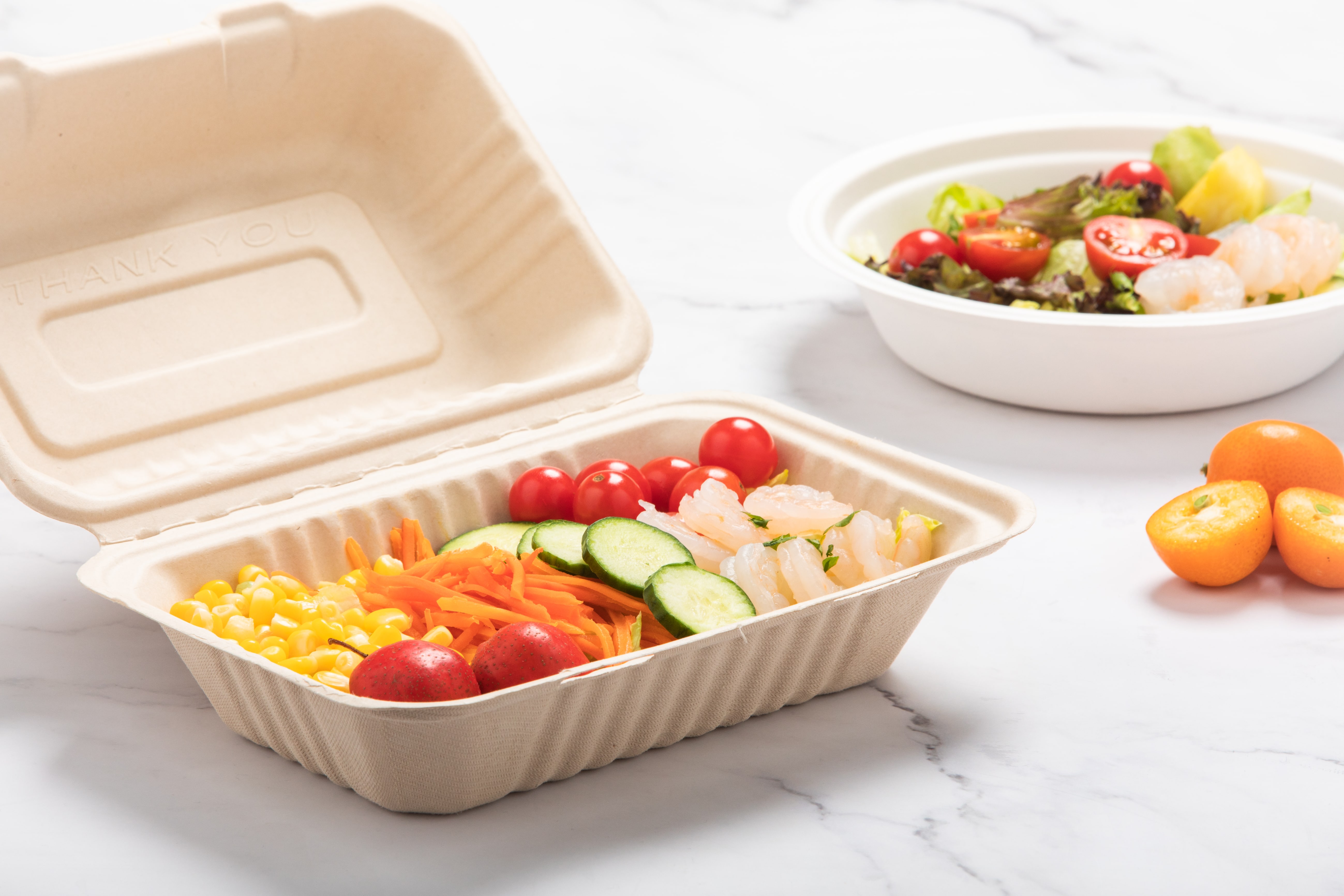
Paperboard containers:
Paperboard containers are an excellent choice for wholesalers seeking eco-friendly alternatives. Made from recycled paper fibers sourced from post-consumer or post-industrial waste streams, these containers minimize the demand for virgin materials and reduce deforestation impacts associated with traditional paper production methods. Paperboard is ideal for packaging dry food items and beverages, providing a sustainable solution without compromising on functionality or performance.
Cardboard boxes:
Cardboard boxes are constructed from recycled cardboard material, making them an essential part of the circular economy. By utilizing post-consumer or post-industrial waste, these containers help minimize landfill waste and conserve natural resources. Cardboard boxes are highly versatile and can be used for shipping and storing various products.
Their durability and strength ensure the safe transportation of goods while reducing environmental impact.
Compostable Containers
PLA (Polylactic Acid):
PLA is derived from renewable resources like corn starch, making it a sustainable alternative to traditional plastic packaging materials. Compostable under specific conditions, PLA containers break down into natural components within industrial composting facilities. This process helps divert organic waste from landfills while producing nutrient-rich compost that can enrich soil quality.
The use of PLA promotes resource efficiency and reduces reliance on non-renewable fossil fuels.
The availability of eco-friendly containers wholesale offers businesses an opportunity to reduce their environmental footprint while meeting consumer demands for sustainable packaging solutions. Whether it's biodegradable options like plant-based plastics, bagasse, or bamboo containers; recycled paperboard or cardboard boxes; or compostable PLA containers – each choice contributes to a more sustainable future by reducing waste generation and promoting responsible resource management practices.
By embracing these alternatives, wholesalers can not only positively impact the environment but also cultivate a positive brand image that resonates with eco-conscious consumers. Let us embark on this journey together, nurturing our planet for generations to come.


